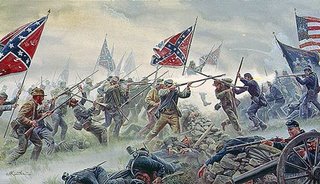
High tide of the Confederacy ends at a stone wall
in a Pennsylvania field [Mort Kunstler painting]
The meaning of the 4th of July
In the hot afternoon sun of 3 July 1863, Federal troops turned back Pickett's final, desperate assault on the center of Union lines at Gettysburg. The smoke of the cannons blotted out the sun, turning it into an eerie red ball hanging in the summer sky; the thunder of shot and shell, cannister and exploding ordinance joined in incessant, deadly chorus with the crashing fire of muskets and rifles: souls streamed toward heaven's door from such battlefield destruction never seen before on human soil.
Waves of shot and shell ripped through the ripening wheat as the fixed, glistening lines of proud Confederate warriers marched through the valley of harvest: "There go the boys that will march through your lines!" one Conderate medic told a wounded Union prisoner. And march they did, to the very gates of hell it seemed, but not through Federal lines that day...
The attack crossed a mile of open field, enduring horrid casualties, briefly pierced the center line at the stone wall, wavered...then fell back: broken, blood poured out like water on shattered wheat -- once waving wheat now flattened under continuous cannon concussion, splattered with the blood of a divided nation.
But what did this fateful attack at Gettysburg mean? And how did it affect that glorious Independance declared 87 years earlier on July 4?
Had the attack succeeded, had Gettysburg ended in Confederate victory, Conderate General Robert E. Lee already had drawn up cease-fire partition plans to submit to President Lincoln in Washington. And such was the state of the war that such "seperate but equal" plan undoubtedly would have been supported by Congress: already Lincoln stood very alone in his resolve of a unified America free of slavery: a war-time President, he carried the weight of the war on his shoulders, to the constant vilification of media and political enemies.
The nation would have been split -- if not irrevocably, at least for a foreseeable future -- and all this would have meant for a world that so desperately needed a whole America.
"A house divided against itself cannot stand," said One who walked this human sod; and a divided house could not have stood against lurking totalitarian evil: the evil within our own national breast threatened our intended power against the evil that would sweep over the world a few decades later.
"Righteousness exalts a nation, but sin is a reproach to any people," said the prophets.
There, in the rolling fields of Gettysburg, the result of sin was seen in spades -- surely angels wept in the shattered atmosphere, where souls lingered in silent tears. Yet mercy was also poured out with the valiant blood: a nation yet stood, Independence still meant light for the world. July 4 now meant far, far more to a fledgling nation, nation humbled under Almighty hand.
When word of Gettysburg [and Vicksburg] reached Lincoln on the 7th, he stood in the early evening of Washington, sober and humble. He spoke to gathered persons and reporters, but was so humble, and so overcome with emotion, that he could only speak a few sentences: he said something to the effect that such occasion demanded a speech so eloquent that he was not up to the task.
He knew the truth: a nation had been preserved.
And later, in his humility, he spoke words worthy of a day of Freedom, words only he could have written and spoken:
Fourscore and seven years ago our fathers brought forth on this continent a new nation, conceived in liberty and dedicated to the proposition that all men are created equal.
Now we are engaged in a great civil war, testing whether that nation or any nation so conceived and so dedicated can long endure. We are met on a great battle field of that war. We have come to dedicate a portion of that field, as a final resting place for those who here gave their lives that that nation might live. It is altogether fitting and proper that we should do this.
But, in a larger sense, we can not dedicate -- we can not consecrate -- we can not hallow -- this ground. The brave men, living and dead, who struggled here, have consecrated it, far above our poor power to add or detract. The world will little note, nor long remember, what we say here, but it can never forget what they did here. It is for us the living, rather, to be dedicated here to the unfinished work which they who fought here have thus far so nobly advanced. It is rather for us to be here dedicated to the great task remaining before us -- that from these honored dead we take increased devotion to that cause for which they gave the last full measure of devotion -- that we here highly resolve that these dead shall not have died in vain -- that this nation, under God, shall have a new birth of freedom -- and that government of the people, by the people, for the people, shall not perish from the earth.
Happy Independance Day, America!
May we never forget the meaning of July 4, and how this meaning has been measured and defended in blood on subsequent July 4ths -- a new birth of freedom. May we take renewed devotion to the task yet before us, pleading the grace of God!
And may we never lack in standing against evil in our own time, in our own hearts...
Selah.

No comments:
Post a Comment